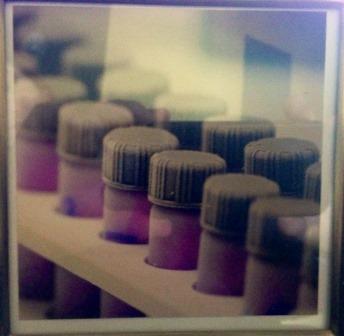It’s safe to say that the period between Thanksgiving and New Year’s Day is the unofficial “season of giving.” It’s a time when we naturally make an extra effort to say thanks to those who have given of themselves in some way or another. Oftentimes, we are taken aback or humbled by expressions of gratitude. This past Thanksgiving was no exception for me.
Out of the blue, I received a card in the mail from a former summer student I mentored as a postdoc in the Biosciences Division. This student is now in graduate school, looking to tackle the grand challenges of remediating polluted environments. She credits her time at Argonne with providing the motivation to endeavor down this path.
The work we did was a bit of an art more than a science. We made “maps” of proteins expressed by bacteria exposed to metals. The techniques we used were delicate and there was always a bit of pride when our maps came out unbroken, distinct, perfect. Along with the card, she shared a photo she had taken of part of the process in which we froze long, thin tube gels of separated proteins in dyed buffer. With an artistic flair, she reminded me of just how beautiful science is.

Vials of frozen tube gels of proteins in dyed buffer–photo by Elise Wall.
As mentors, we are often asked, “What is the benefit of mentoring?” For me, the experience of mentoring a student that summer forced me to stay on my toes and really understand the fundamental reasons why we do the work we do–from why we use one buffer and not another to what is the ultimate outcome of research. Now, through staying in touch, I get to learn about new fields and new questions. In a way, mentoring keeps my curiosity sparked.
This unexpected gift further reminded me of how important it is to be present as a mentor. I can think of my own mentors and how they had the presence of mind to challenge my thinking and motivate me to push harder, to do better. Sometimes this motivation came in the form of constructive criticism, which can be difficult to accept.
This is where the importance of giving and being present come into play. Whether you are mentoring or being mentored, it is crucial to a productive mentoring experience to have the presence of mind to listen, reflect on what we hear and give feedback in a way that encourages progress.
There are tools to foster effective communications in mentoring relationships. In the new year, I hope we can build on some of the best practices that other institutions have found useful, such as this resource guide.
In the meantime, in the spirit of giving and being present, pay it forward and #ThankAMentor.

